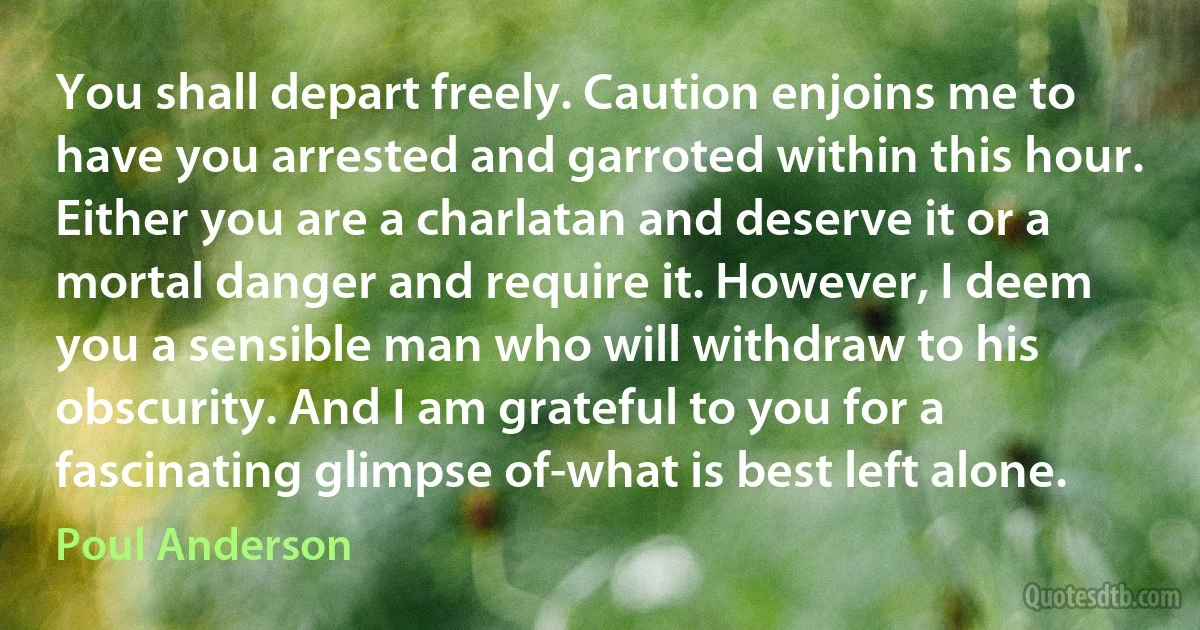Charlatan Quotes
When modernist poetry, or what not so long ago passed for modernist poetry, can reach the stage where the following piece by Mr. Ezra Pound is seriously offered as a poem, there is some justification for the plain reader and orthodox critic who shrinks from anything that may be labelled 'modernist' either in terms of condemnation or approbation.... Better he thinks, that ten authentic poets should be left for posterity to discover than one charlatan should be allowed to steal into the Temple of Fame.

Laura Riding
As much as people dismiss him (Dershowitz) as a clown and charlatan and roll their eyes the fact of the matter is that he very effectively makes use of his Harvard pedigree it is a distinguished university and he has an eminent chair of that university and he makes use of those credentials to lend credibility to his work.

Alan Dershowitz
Now, if Mr. Shaw and Mr. Saroyan are poles apart, no comparison between the two, one great and the other nothing, one a genius and the other a charlatan, let me repeat that if you must know which writer has influenced my writing when influences are real and for all I know enduring, then that writer has been George Bernard Shaw. I shall in my own day influence a young writer or two somewhere or other, and no one need worry about that.
Young Shaw, hello out there.

William Saroyan
It is true that the politician at the moment of his actions or if he explains his actions and justifies them cannot provide at the same time also great philosophy. But if he acts without philosophical and ethical foundations, he is in danger of making mistakes. He is in danger to sink into opportunism. He is even in danger of being a charlatan.

Helmut Schmidt
During his lifetime Gurdjieff did not publish any books on the techniques of his teaching, and his pupils were bound to secrecy on the subject. Since his death in Paris in 1949, however, many of his works have been published, and there has been a flood of memoirs by disciples and admirers. Gurdjieff was in almost ever respect the antithesis of Aleister Crowley. Whereas Crowley craved publicity, Gurdjieff shunned it. Crowley was forgotten for two decades after his death; Gurdjieff on the contrary, has become steadily better known, and his influence continues to grow. One of the main reasons for this is that there was so little of the charlatan about him. He is no cult figure with hordes of gullible disciples. What he has to teach makes an appeal to the intelligence, and can be fully understood only by those who are prepared to make a serious effort.

Colin Wilson
An unbiased reader, on opening one of their [Fichte's, Schelling's or Hegel's] books and then asking himself whether this is the tone of a thinker wanting to instruct or that of a charlatan wanting to impress, cannot be five minutes in any doubt. ... The tone of calm investigation, which had characterized all previous philosophy, is exchanged for that of unshakeable certainty, such as is peculiar to charlatanry of every kind and at all times. ... From every page and every line, there speaks an endeavor to beguile and deceive the reader, first by producing an effect to dumbfound him, then by incomprehensible phrases and even sheer nonsense to stun and stupefy him, and again by audacity of assertion to puzzle him, in short, to throw dust in his eyes and mystify him as much as possible.

Arthur Schopenhauer
In our secret depths, wherever we do our unspoken wishing, either we want life to be tidy, clear, fully understood, contained within definite limits, or we long for it to seem larger, wilder, stranger. Faced with some odd incident, either we wish to cut it down or to build it up.
On this level, below that of philosophies and rational opinions, either we reject or ignore the unknown, the apparently inexplicable, the marvellous and miraculous, or we welcome every sign of them. At one extreme is a narrow intolerant bigotry, snarling at anything outside the accepted world-picture, and at the other is an idiotic credulity, the prey of any glib charlatan. At one end the world becomes a prison, at the other a madhouse.

J. B. Priestley
When Paul thought about his effortless rise in the hierarchy, he sometimes, as now, felt sheepish, like a charlatan. He could handle his assignments all right, but he didn't have what his father had, what Kroner had, what Shepherd had, what so many had: the sense of spiritual importance in what they were doing; the ability to be moved emotionally, almost like a lover, by the great omnipresent and omniscient spook, the corporate personality. In short, what Paul missed was what made his father aggressive and great: the capacity to really give a damn.

Kurt Vonnegut
No one doubts-certainly not I-that the mind exercises a powerful influence over the body. From the beginning of time, the sorcerer, the interpreter of dreams, the fortune-teller, the charlatan, the quack, the wild medicine-man, the educated physician, the mesmerist, and the hypnotist have made use of the client's imagination to help them in their work. They have all recognized the potency and availability of that force. Physicians cure many patients with a bread pill; they know that where the disease is only a fancy, the patient's confidence in the doctor will make the bread pill effective.

Mark Twain
I trust I have not grown so gullible as to consult a doctor,” the bureaucrat said with dignity. "If I want medical attention, I hall employ the qualified machinery or, in extremis, a human with proper biomedical augmentation. But I will not swill down fermented swamp guzzle at the behest of some quasi-literate, uneducated charlatan.

Michael Swanwick
Dull headed I am, you are the very progenitor of cupid
Forgiving my countless sins please save me...
I am the sinner and you remove the sins on me
Anger, vanity, arrogance I am filled with these
Make me fearless removing my worries
False shadowy forms engross me
You are the redeemer to those who seek refuge
Worst criminal I am you remove hurdle rocks that huge
Bewildered I am you save me as you foresee
Charlatan I am and you are without vanity
Unlucky I am you are lord of wealth divine
Can I comprehend past or future of mine?
Oh Purandara Vittala Raya my father
Perpetually you save me without bother.

Purandara Dasa
One of the saddest lessons of history is this: If we've been bamboozled long enough, we tend to reject any evidence of the bamboozle. We're no longer interested in finding out the truth. The bamboozle has captured us. It's simply too painful to acknowledge, even to ourselves, that we've been taken. Once you give a charlatan power over you, you almost never get it back.

Carl Sagan



